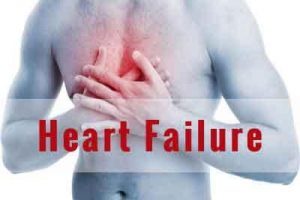- Home
- Editorial
- News
- Practice Guidelines
- Anesthesiology Guidelines
- Cancer Guidelines
- Cardiac Sciences Guidelines
- Critical Care Guidelines
- Dentistry Guidelines
- Dermatology Guidelines
- Diabetes and Endo Guidelines
- Diagnostics Guidelines
- ENT Guidelines
- Featured Practice Guidelines
- Gastroenterology Guidelines
- Geriatrics Guidelines
- Medicine Guidelines
- Nephrology Guidelines
- Neurosciences Guidelines
- Obs and Gynae Guidelines
- Ophthalmology Guidelines
- Orthopaedics Guidelines
- Paediatrics Guidelines
- Psychiatry Guidelines
- Pulmonology Guidelines
- Radiology Guidelines
- Surgery Guidelines
- Urology Guidelines
Diabetics have higher risk of heart failure hospitalization: Circulation Study

Scotland: Diabetic people are at 2-fold higher risk of heart failure hospitalization than those without diabetes, with higher case-fatality in those with type 1 diabetes (T1D) according to a new study followed for a period of 10 years.
Recent clinical trials of new glucose-lowering treatments have drawn attention to the importance of hospitalization for heart failure as a complication of diabetes. However, the epidemiology is not well described, particularly for T1D.
Findings of the study, published in the journal Circulation, support the view that heart failure is an under-recognized and important complication in diabetes mellitus, particularly for T1D.
David A. McAllister, the University of Glasgow in Scotland, and colleagues examined the incidence and case-fatality of heart failure hospitalizations in the entire population aged ≥30 years resident in Scotland from 2004 to 2013 among 3.25 million Scottish residents.
Also Read: Coronary artery surgery can prevent heart failure in diabetes patients : JACC Study
Key Findings:
- Over the 10-year period of the study, among 3.25 million people there were 91, 429, 22 959, and 1313 incident heart failure events among those without diabetes, with type 2, and type 1 diabetes, respectively.
- The crude incidence rates of heart failure hospitalization were therefore 2.4, 12.4, and 5.6 per 1000 person-years for these 3 groups.
- Heart failure hospitalization incidence was higher in people with diabetes, regardless of type than in people without.
- Relative differences were smallest for older men, in whom the difference was nonetheless large.
- Rates declined similarly, by 0.2% per calendar-year, in people with T2D and without diabetes.
- Rates fell faster, however, in those with T1D.
Also Read: Compared to teetotallers moderate drinkers have fewer hospitalizations
Based on the findings, the authors concluded that despite falling incidence, particularly in T1D, heart failure remains ≈2-fold higher than in people without diabetes, with higher case-fatality in those with T1D.
For further reference log on to https://www.ahajournals.org/doi/abs/10.1161/CIRCULATIONAHA.118.034986

Disclaimer: This site is primarily intended for healthcare professionals. Any content/information on this website does not replace the advice of medical and/or health professionals and should not be construed as medical/diagnostic advice/endorsement or prescription. Use of this site is subject to our terms of use, privacy policy, advertisement policy. © 2020 Minerva Medical Treatment Pvt Ltd